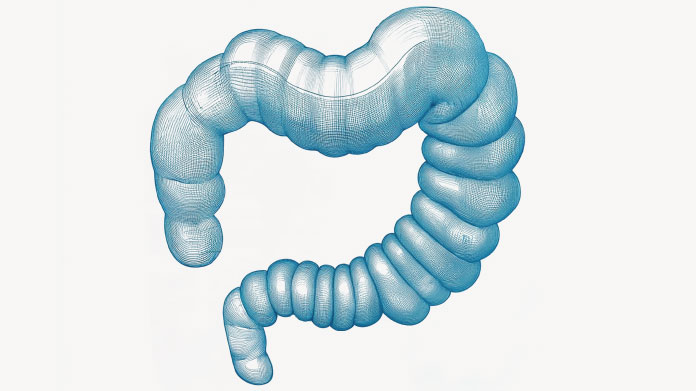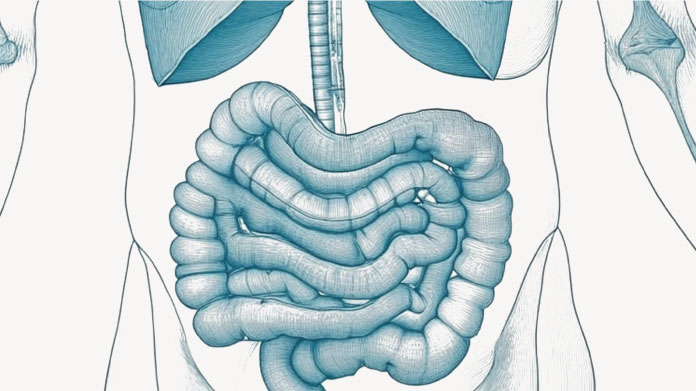How to eliminate intestinal gas naturally?
It’s normal to pass wind around 14 times a day. But the intestinal gas produced in the course of digestion can become a real problem when it’s excessive, foul-smelling or causes bloating. Here’s how to get rid of it.

What causes flatulence?
Bloating, feeling like your stomach’s swollen, nasty-smelling wind: all these non-serious but troublesome symptoms are caused by digestion. The digestive system is a complex, highly effective machine in which each cog (mouth, stomach, small intestine, colon) has its own specific function (1) :
- thus the mouth and intestine perform firstly a mechanical function: ingested food is reduced to a ‘mush’ which encourages consistent, comprehensive enzymatic activity;
- enzymes and gastric juices in the mouth, stomach and liver break down food into elements that the body can absorb;
- villi on the lining of the small intestine enable the nutrients produced by these first stages of digestion to cross the gut wall and enter the bloodstream;
- bacteria in the colon, often referred to as gut flora, complete the process by digesting and dissolving anything
It’s primarily during this last stage that intestinal gas is produced, since as part of the process of dispensing with any superfluous organic matter, fermentation of bacteria occurs in the colon. This fermentation produces potentially malodorous gases: CO2, methane, hydrogen sulphide.
These bacteria-derived gases account for on average 75% of intestinal gas volume (2). The remaining 25% comes from the air we take in when we eat this is called aerophagy (3).
What causes painful intestinal gas?
Potentially painful gas occurs when too much gas accumulates in the colon without being able to escape. This happens for several reasons.
Behaviour and posture
Drinking too many fizzy drinks (which along with gas, also contain sugar which is sometimes poorly digested) and chewing too much gum (which encourages autophagy) have been identified by doctors as a key factor in bloating and excessive flatulence.
Remaining in a sitting position can also cause bloating: working at a desk where you stay seated for hours, before, during and after eating, compresses the abdomen and encourages bloating.
Constipation
Stools, or even blockages, form a ‘bottleneck’ which makes it difficult to pass gas, and causes painful pressure in the abdomen.
Diet
Certain foods are known to be highly fermentable, although the specific polysaccharides responsible have yet to be identified by scientists (4).
The foods primarily to blame are cruciferous vegetables (from the cabbage family), pulses (lentils, chickpeas, split peas, soya, etc.) and red meat. Eating a lot of crudités may also encourage production of gas.
Irritable bowel syndrome (IBS)
Between 5% and 10% of the population may suffer from IBS, according to the French National Institute for Agricultural Research (5).
Behind this umbrella term, lies a diverse range of issues: proliferation of bacteria in the small intestine, disruption to the gut microbiota (which can however be nourished by ingesting the ‘good’ bacteria in probiotics), increased permeability of the intestinal barrier, gut infections, non-coeliac sensitivity to gluten, etc. (6)
Flatulence: various solutions
You need to be aware of all these causes of flatulence so that you can employ the right strategies to combat them. It’s important to identify your particular triggers and then progressively apply measures until you find the right combination of remedies to help get rid of your intestinal gas problem:
Change your dietary habits
This is easy if you know you regularly consume substantial amounts of the foods associated with flatulence, whether foul-smelling or not. The first step is therefore to reduce, bit by bit, or even exclude the foods that may be responsible: fizzy drinks, chewing gum, red meat, eggs, cabbage, pulses, lactose, gluten.
You’ll need to adapt this strategy to your own particular diet: obviously vegetarians may find it hard to exclude pulses from their diet, as their protein intake would then have to come almost exclusively from algae and nuts!
In the same vein, there’s no point following a gluten-free diet (which is particularly restrictive) without first eliminating the foods that are primarily causing your flatulence.
Finally, it may be help to take more exercise and/or sit on an ergonomic chair when working to reduce the time you spend ‘slumped’ over your desk.
Plants good for digestive health
Used for thousands of years in traditional medicine and phytotherapy, certain plants are invaluable for helping to reduce flatulence.
Indeed, grandmothers’ remedies for such problems very often centred around teas and tisanes made from plants such as camomile.
Peppermint is well-known for promoting good digestive tract function and for helping to eliminate digestive discomfort (7). Fenugreek, too, has a similar positive effect on digestion (8).
To benefit from an excellent intake of peppermint and fenugreek (among other useful compounds), a good option is the excellent supplement Digestive Enzymes.
Activated charcoal: a recognised natural remedy
Activated charcoal is a natural remedy recognised by European health authorities and doctors for helping to reduce excessive flatulence after meals (9).
Its use dates back to antiquity when it was recommended by Hippocrates as a way of purifying water. An entirely natural substance, activated charcoal comes from a carbonaceous material such as coconut shells and certain types of wood, which is then activated to increase its porosity and surface area, and consequently, its effect on the gut. When it reaches the intestine, activated charcoal captures molecules of gas or fluid around it: it is thus termed ‘adsorbent’. Activated charcoal can retain up to 100 times its volume in intestinal gas! You could opt, for example, to take Charcoal, an excellent activated charcoal supplement.
A note of caution: as charcoal remains in the body and has an indiscriminate action, it can also ‘adsorb’ certain drugs. It’s therefore important to consult your doctor before taking an activate charcoal supplement if you are on any medication.
So now you have all the information you need to get rid of your intestinal gas naturally.
References
- https://www.vidal.fr/sante/nutrition/corps-aliments/digestion-aliments.html
- Sven Kurbel, Beatrica Kurbel, Aleksandar Včev, Intestinal gases and flatulence: Possible causes of occurrence, Medical Hypotheses, Volume 67, Issue 2, 2006, Pages 235-239, ISSN 0306-9877, https://doi.org/10.1016/j.mehy.2006.01.057
- https://www.vidal.fr/maladies/estomac-intestins/ballonnement-flatulence-aerophagie.html
- Price, K.R., Lewis, J., Wyatt, G.M. and Fenwick, G.R. (1988), Review article Flatulence — Causes, relation to diet and remedies. Nahrung, 32: 609-626. https://doi.org/10.1002/food.19880320626
- https://www.inrae.fr/actualites/syndrome-lintestin-irritable-nouveau-mecanisme-expliquant-douleur-abdominale
- Echinard Flore, « Microbiote et troubles fonctionnels de l’intestin », Hegel, 2016/4 (N° 4), p. 436-439. DOI : 10.3917/heg.064.0436. URL : https://www.cairn.info/revue-hegel-2016-4-page-436.htm
- EFSA Register of Questions - Europa EU
- EFSA Register of Questions - Europa EU
- Jain, N. K.; Patel, V. P.; Pitchumoni, C. S., Efficacy of Activated Charcoal in Reducing Intestinal Gas: A Double--Blind Clinical Trial, American Journal of Gastroenterology (Springer Nature) . Jul1986, Vol. 81 Issue 7, p532-535. 4p. 2 Charts, 2 Graphs.
64 Days
Very happy with the order and the…
Very happy with the order and the prompt team's response to an identified issue with my order.
KUQI Fatmir
71 Days
15 + years as a customer
I have been using their products for over 15 years as I find both the quality and pricing excellent.
Del Chandler
73 Days
Good quick delivery
Good quick delivery
Timothy O Shea
74 Days
Good service
Good communication following order. Product came within the time frame and was well packaged. The only confusing thing I found was in checking out. For some reason it is not clear how to do so and the current system should be improved.
Joe O Leary
83 Days
Simple and fast.
Simple and fast.
Nina
84 Days
Great product was definitely what is…
Great product was definitely what is says and arrived on without issue
customer
90 Days
I love reading those product facts on…
I love reading those product facts on Supersmart.com. Effective health products making permanent changes to my blood-work results and testes. However, I also have to order capsules from other websites.
NORDGULEN Olav
92 Days
Great products
Great products Very easy to choose, to order… and to get at home
Federica mastrojanni
95 Days
Service rapide et bons produits
Service rapide et bons produits
customer
96 Days
Good products and fast delivery
Good products and fast delivery
Trusted
101 Days
Does what it says on the can
I believe in this product Made to highest standard The ordering process is straightforward Delivery time prompt Excellent product, excellent service Happy customer ❤️
Sheba Kelleher
106 Days
Excellents produits
Excellents produits. Rien à dire si ce n'est qu'ils sont très chèrs.
MJS_France
108 Days
Very good supplement
Very good supplement
Glaveash
109 Days
Supersmart supplements are really…effective
Supersmart supplements are really effective and have helped me and family members and friends to improve their health including some of us with severe health problems including some with no existing medical treatment.
Anne Georget
111 Days
SuperBig Supersmart
SuperBig Supersmart
Pierre



